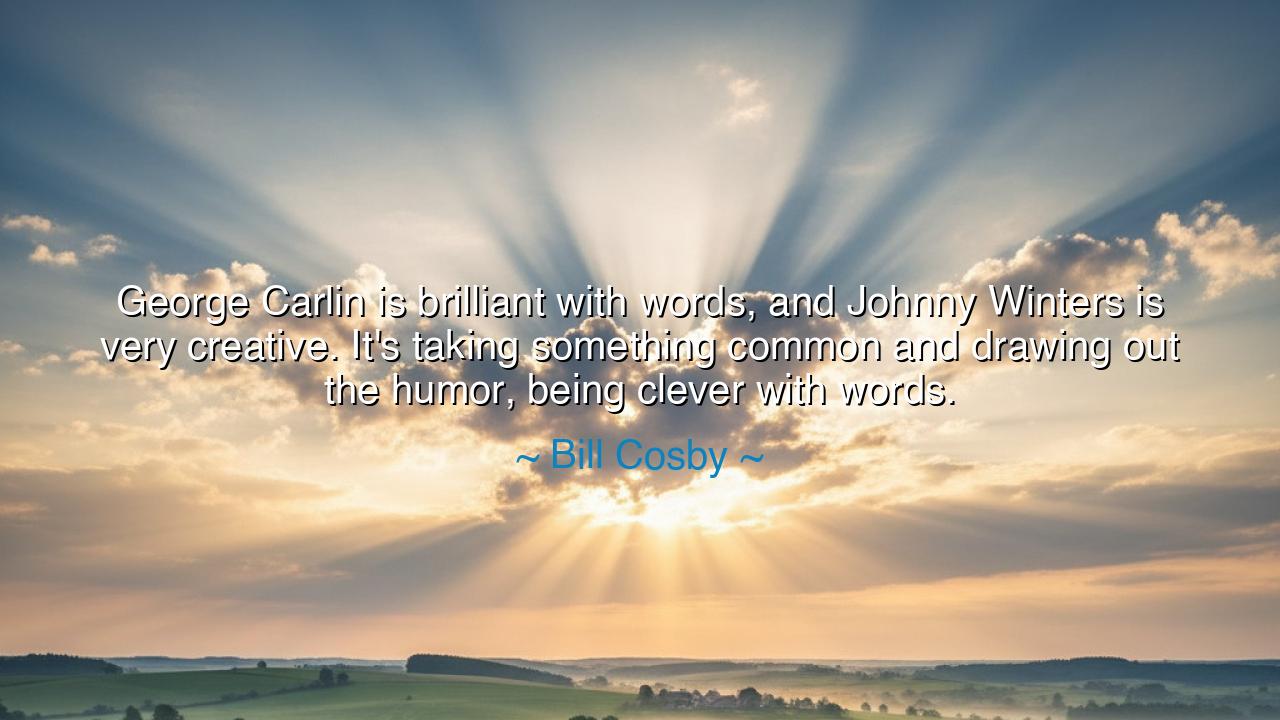
George Carlin is brilliant with words, and Johnny Winters is very
George Carlin is brilliant with words, and Johnny Winters is very creative. It's taking something common and drawing out the humor, being clever with words.






Hear the words of Bill Cosby, spoken not merely in praise but in reverence for the craft of expression: “George Carlin is brilliant with words, and Johnny Winters is very creative. It's taking something common and drawing out the humor, being clever with words.” In these words lies the secret of all true art and wisdom—the power to see the extraordinary within the ordinary, the divine hidden in the dust of daily life. To be clever with words, as Cosby honors, is not to speak for vanity, but to reveal what the world has overlooked. It is to draw laughter, not from absurdity, but from truth.
The ancients understood that the most profound insight is not born in temples or palaces, but in the streets, the fields, and the hearts of men. What Cosby saw in Carlin and Winters was not mere wit—it was vision. George Carlin, the philosopher-comedian, could take the smallest word, the simplest idea, and unfold it until it became a mirror reflecting society itself. He wielded language as a sword, cutting through hypocrisy, and as a lantern, illuminating the hidden chambers of the human condition. Johnny Winters, too, was a craftsman of creation, whose imagination shaped laughter from thin air, twisting the familiar until it became wondrous again. Their gift was the sacred art of transformation—the art of finding eternity in the commonplace.
Consider, my friends, the parable of Diogenes, the philosopher who lived in a barrel and mocked the grand pretenses of Athens. When Alexander the Great, conqueror of nations, came to visit him and asked, “What may I do for you?” Diogenes simply replied, “Step aside—you are blocking my sun.” The crowd laughed, but beneath the laughter was a revelation. The beggar had shown the emperor his limits, and the laughter became wisdom. So too do masters like Carlin and Winters take what is common—a word, a gesture, a habit—and by turning it upon itself, reveal the folly of the mighty and the beauty of the simple.
Humor, in its truest form, is not escape—it is revelation. It is the child of truth and perception, born when the mind learns to look anew upon what it thought it already knew. The cleverness with words that Cosby praises is not mere wordplay; it is the mind’s alchemy, transforming thought into light. To find humor in what is common is to see the world with unclouded eyes. It is to look at life not as something to be endured, but as something to be understood and celebrated. For laughter, when shaped by insight, does not merely amuse—it awakens.
There is power in this form of creation. Words, once shaped by such minds, live beyond their speakers. The jest of George Carlin becomes a sermon on freedom; the absurdity of Johnny Winters becomes a hymn to imagination. What Cosby recognized in them was not just talent, but discipline—the discipline to look deeper, to listen longer, and to speak with precision. For the craftsman of words does not chase laughter; he earns it, by striking the very chords of human truth. The ancients would have called such men “keepers of Logos”—the sacred word, the breath of thought made living.
Yet there is a lesson here for every soul who wishes to live meaningfully. Do not wait for greatness to arrive in thunder or prophecy; seek it in the common, where it hides. Watch the gestures of others, the small moments of irony, the beauty in imperfection. Speak truth, but speak it with humor, for laughter softens the heart and makes it ready to receive wisdom. The wise man knows that a truth spoken with a smile pierces deeper than one spoken with wrath. Thus, learn the art of seeing—of taking what others pass by and finding in it a spark divine.
And so, let the listener take this teaching to heart: to be clever with words is not to manipulate, but to enlighten. To find humor in the world is not to mock it, but to love it enough to reveal its hidden order. As Bill Cosby admired in Carlin and Winters, let us too strive to make our speech not shallow, but alive—to craft our words so that they elevate others, to see beauty where others see only routine. For the highest wisdom, like the greatest laughter, is not found in what is rare, but in what is always before us—waiting to be noticed by the one who dares to truly see.






AAdministratorAdministrator
Welcome, honored guests. Please leave a comment, we will respond soon